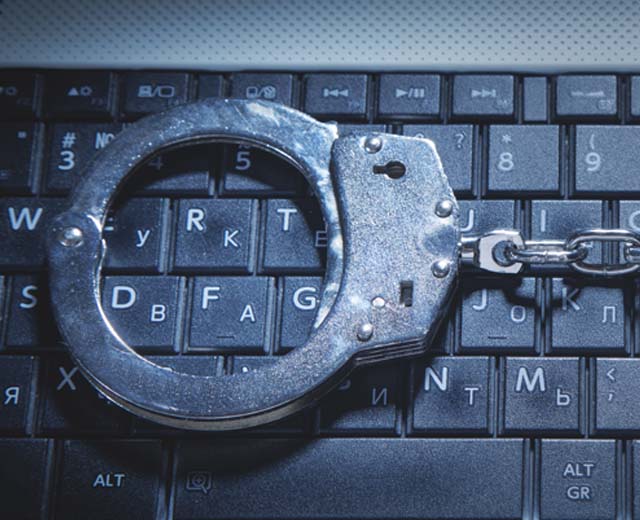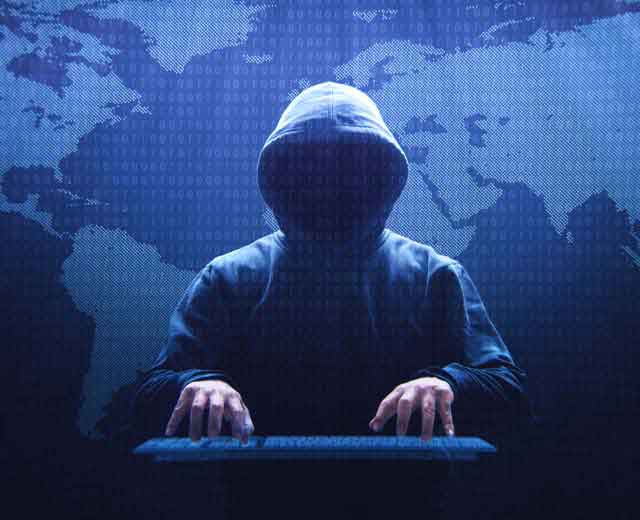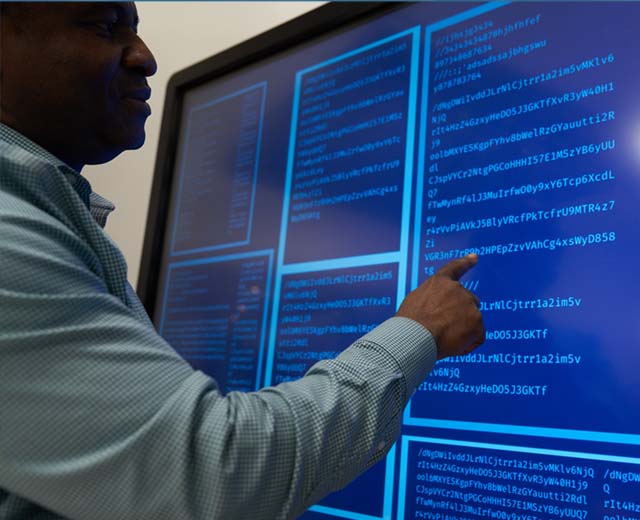See Courses & Program Info
View a complete list of program courses, program-specific and degree-level requirements, industry certification exams, and more.
This program requires a total of 30 credits. You’ll take 15 credits of core courses, 12 elective credits, and a 3-credit capstone.
Core Courses
- (3 Credits, DFCS 605)
- (3 Credits, DFCS 615)
- (3 Credits, DFCS 625)
- (3 Credits, DFCS 635)
- (3 Credits, DFCS 645)
Elective Courses
Take four 3-credit elective courses (outlined under Select Digital Forensics & Cyber Investigation Elective Courses) for a total of 12 credits.
Capstone Course
- (3 Credits, DFCS 690)
This program requires a total of 12 elective credits. To fulfill this requirement, you'll need to take four of the courses listed below.
- Where specified, if you take four courses from a topic area, you may be able to earn a graduate certificate.
- You may also choose to mix and match these credits to retain a more general focus.
Digital Forensics & Cyber Investigation
- (3 Credits, DFCS 655)
- (3 Credits, DFCS 660)
- (3 Credits, DFCS 665)
- (3 Credits, DFCS 685)
- (3 Credits, DFCS 686)
Cloud Computing Systems
Complete these four courses to earn a graduate certificate in cloud computing and networking.
- (3 Credits, CLCS 605)
- (3 Credits, CLCS 615)
- (3 Credits, CLCS 625)
- (3 Credits, CLCS 635)
Cyber Operations
Complete these four courses to earn a graduate certificate in cyber operations.
- (3 Credits, CYOP 605)
- (3 Credits, CYOP 615)
- (3 Credits, CYOP 625)
- (3 Credits, CYOP 635)
Cybersecurity Management & Policy
Complete these four courses to earn a graduate certificate in cybersecurity management and policy:
- (3 Credits, CMAP 605)
- (3 Credits, CMAP 615)
- (3 Credits, CMAP 625)
- (3 Credits, CMAP 635)
Cybersecurity Technology
Complete these four courses to earn a graduate certificate in cybersecurity technology:
- (3 Credits, CTCH 605)
- (3 Credits, CTCH 615)
- (3 Credits, CTCH 625)
- (3 Credits, CTCH 635)
Data Analytics
Complete these four courses to earn a graduate certificate in business analytics:
- (3 Credits, DATA 605)
- (3 Credits, DATA 615)
- (3 Credits, DATA 625)
- (3 Credits, DATA 635)
General Master's Degree Requirements
- You must maintain a GPA of 3.0 or higher at all times.
- All degree requirements must be fulfilled within five consecutive years.
- Any transfer credits must have been earned within the above five-year time frame to be applied toward a graduate degree.
- Please review the overall master’s degree requirements for additional considerations.
For some of the upper-level cybersecurity and IT courses in this program, you will need equipment that meets the following specifications. Courses in graphics- or computing-intensive disciplines may require a higher processing speed, more RAM, and/or better screen resolution.
Hardware Requirements
- 64-bit processor, Intel Core i5 (7th generation or higher), or equivalent (e.g., AMD, M1)
- Processor speed: 1.5 GHz or higher (2 GHz recommended)
- Storage: At least 250 GB (SSD [preferred] or HD), with at least 30 percent free space
- RAM: At least 4 GB (8 GB recommended)
- Display/monitor: Minimum 13”
- Screen resolution: Minimum 1280 px x 1024 px
- Keyboard and mouse/trackpad
- High-speed Internet connection (Ethernet or Wi-Fi)
- 32-bit video card
Operating System
Choose one of the following:
- Windows 10 (recommended; version 1909 or higher required for any course using Adobe Creative Cloud)
- Mac OS X 10.15 or higher
- Ubuntu 18.04+ (or other Linux LTS)
Software
- Microsoft Office 2019 or later (Office 365 Education is available for free with your student email address.)
- Most recent version/update of a web browser (Firefox, Safari, or Chrome)
- Antivirus software
- Adobe Acrobat PDF Reader
Additional Recommendations
- Built-in camera (or USB port for a webcam)
- Built-in microphone and speakers (or USB ports for external audio devices)
Accelerated Pathway
If you completed your bachelor's degree in cybersecurity technology at UMGC, an accelerated pathway between UMGC's graduate and undergraduate degree programs in that field may allow you to reduce your total coursework for this program.
Related Graduate Certificate
Completing the coursework for the graduate certificate in digital forensics and cyber investigation may allow you to earn a credential while getting a 12-credit head start on this master’s degree program.
This program is designed to help prepare you for the following certification exams:
- EC-Council Certified Incident Handler (ECIH)
- EnCase Certified Examiner (EnCE)
- GIAC Certified Forensic Analyst (GCFA)
- GIAC Certified Forensic Examiner (GCFE)
- GIAC Network Forensic Analyst (GNFA)
This information is for students who enroll in the 2025–2026 academic year. For prior year requirements for this program or to review UMGC's complete program requirements for a specific academic year, visit our program catalog archive.
Gain Career-Focused Digital Forensics Experience
In today’s interconnected world—where large quantities of sensitive company data are stored in computers and in the cloud—employers are seeking professionals who can anticipate and protect against cyber threats. This program is designed to prepare students to pursue careers in digital forensics, incident response and cyber investigations. UMGC refreshes and updates the online master’s degree in digital forensics and cyber investigation curriculum regularly, with a focus on helping students achieve the following: UMGC refreshes and updates the curriculum regularly, with a focus on helping students achieve the following:
Unlock Your Career Potential
This program is designed to help prepare you for work in government organizations, the private sector, and law enforcement agencies in the areas of computer and digital crime. Potential job titles within specific digital forensics and cyber investigation careers include cyber defense forensics analyst, cyber defense incident responder, systems security analyst, law enforcement/counterintelligence forensics analyst, and information security analyst.
Practice Real-World Skills in Your Digital Forensics Courses
Throughout your curriculum, your instructors will assign coursework that may help you prioritize real-world skills and experience. In past courses, students have been able to complete the following course projects:
- Demonstrate how to properly use digital forensics tools and technologies in various criminal and security breach situations, including preparing reports and presenting findings.
- Design and implement strategies for proper seizure, evidence handling, investigation, and analyze digital artifacts, including report preparation and presenting findings.
- Assess an information architecture for potential security threats and evidentiary value.
- Use the appropriate tools to analyze log files to detect adversaries’ threats and attacks.
- Use Ghidra and other reverse engineering tools to analyze malicious files and malware to improve an organization’s overall security posture.
- Acquire a forensically sound image and analyze a user’s activity to recover deleted or hidden information from different media types.
Explore UMGC Cybersecurity Insights
Gain insight from our faculty and staff and delve deeper into a range of topics, including the career potential of digital forensics majors and how to apply cybersecurity-related principles to everyday activities.
FAQs
Get answers to questions that current and prospective students are asking about program admission, credibility, student organizations, and more.
A master's in digital forensics and cyber investigation is a graduate-level program that focuses on the identification, preservation, analysis, and presentation of digital evidence in a legal context. UMGC's online Master of Science in digital forensics and cyber investigation degree is a 30-credit program that covers topics like forensic examination tools and technologies, best practices in forensic examinations, artifact reconstruction and recovery, evidentiary volume and encryption, and more. Graduates of the program are prepared for careers as digital forensic analysts, forensic examiners, forensic consultants, and information security managers.
At UMGC, we want you to be happy with the investment you make in your education, and we work hard to keep our programs affordable. When you choose to pursue your master's in digital forensics and cyber investigation at UMGC, you can rest assured that the quality of our curriculum is backed by our status as an accredited state university and a member institution of the University System of Maryland.
Deciding whether an online master's degree in digital forensics and cyber investigation is worth it for you ultimately depends on your individual needs and goals. If you're not sure whether this is the right program for you or need help figuring out how to fit the program into your life, don't hesitate to reach out to us—our advisors and success coaches are happy to help.
UMGC's online master's degree in digital forensics and cyber investigation is a 30-credit program with courses offered year-round. If you take two courses per term, you can finish the program in as little as 18 months. If you recently completed an undergraduate degree in cybersecurity technology at UMGC, you may be able to apply credits toward your graduate degree and shorten your time to completion.
UMGC is committed to keeping our tuition and fees as affordable as possible. The master's degree in digital forensics and cyber investigation follows the specialty graduate program tuition rates, which appear at the top of this webpage. We also offer scholarships for eligible students, an interest-free monthly payment plan, and no-cost digital materials in place of most textbooks to help make your education more affordable.
You don't need to have majored in any specific area to be successful in the master's in digital forensics and cyber investigation at UMGC. However, we do recommend you have a background in computing and programming. Strong writing skills are also encouraged.
This program is designed for those who want to develop skills and competencies in the analysis of digital evidence. This may lead to positions tracking cyber intruders or digital evidence within government and private organizations as well as law enforcement.
This program focuses on the investigation area of a cyber attack and collecting evidence from digital assets of other specific activity. It will help you develop your competencies in finding, accessing and analyzing digital evidence left on a variety of devices from computers to smartphones and tablets. The program will require that you become adept with network, computer, and digital analysis technologies at an intermediate level.
Computing Club
The Computing Club provides a dynamic environment where members can work collaboratively, share innovative ideas, enhance their career-readiness, and gain marketable experience in their respective fields. It is available to graduate or undergraduate students, alumni, faculty, and staff members. Students and alumni can join the Computing Club group on CareerQuest.
Cyber Competition Team
The Cyber Competition Team represents UMGC at various cybersecurity events and tournaments nationwide. Being a member of the team gives students an opportunity to develop their cybersecurity skills and network with other students. The team is open to undergraduate and graduate students and alumni through a tryout process. Email jesse.varsalone@umgc.edu or visit the team webpage to learn more.
Upsilon Pi Epsilon (Computing & Technology Disciplines)
Upsilon Pi Epsilon, the international honor society for the computing and IT disciplines, is designed to promote the computing and information sciences and to encourage the enhancement of knowledge in the field. Upsilon Pi Epsilon is open to both undergraduate and graduate students who are pursuing a degree in the computing and information science disciplines. Membership is by invitation only.
Undergraduate membership is open to students majoring in one of the computing disciplines who have completed at least 45 credit hours towards their degree, including 30 or more credits at UMGC (in graded coursework) and at least 15 credits from information technology and computer science courses. Undergraduate students need to have a cumulative GPA of a 3.5 or higher and a GPA of 3.5 or higher in all coursework taken from the information technology and computer science courses.
Graduate student membership is open to students pursuing a master's degree in cloud computing systems, cyber operations, cybersecurity management and policy, cybersecurity technology, data analytics, or digital forensics and cyber investigation; a master's degree in information technology with a concentration in database systems technology, informatics, information assurance, software engineering, or systems engineering; or a legacy master's degree in cybersecurity. Graduate students must have completed at least 18 resident credits towards their degree at UMGC, with a cumulative GPA of a 3.5 or higher.
For more information, please email upe@umgc.edu.
Suzan L., Guam MS in Digital Forensics & Cyber Investigation



/blog-umgc-cybersecurity-pen-test-linklist-shutterstock-2373338757.jpg)
/blog-banner-linklist-cybersecurity-program_shutterstock_2499480585.jpg)
/blog-banner-linklist-drazek-winners_mock-drazek-crystal-award.jpg)



